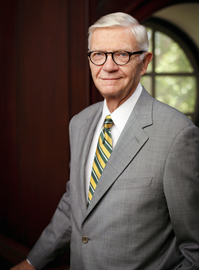W&M Board approves 1st merit-based increase for President Reveley
The William & Mary Board of Visitors on Friday approved the first merit-based salary increase for President Taylor Reveley since he became president six years ago. The change to Reveley’s compensation package will be funded entirely with private funds. It follows a third-party competitive market compensation review that found Reveley’s salary was far below presidents at W&M’s peer institutions. It also follows Board action in November to extend the president’s contract through June 2017.
 “President Reveley has repeatedly refused to accept merit increases until we could do something more comprehensive for all William & Mary employees,” said Todd Stottlemyer ’85, Rector of the Board of Visitors. “Thanks to his leadership, that has begun to occur. This is long overdue.”
“President Reveley has repeatedly refused to accept merit increases until we could do something more comprehensive for all William & Mary employees,” said Todd Stottlemyer ’85, Rector of the Board of Visitors. “Thanks to his leadership, that has begun to occur. This is long overdue.”
The change represents the first increase in the private portion of the president’s compensation since Reveley became president in 2008. Like all state employees, Reveley received a 2 percent increase to his state portion last summer – the first increase of any kind for Reveley.
Friday’s action increases Reveley’s total salary from $335,245 to $425,000. The president’s salary is funded by both private funds and state funds. According to the Board action, the private portion of the president’s salary will increase from $174,851 to $264,606. The state portion remains at $160,394.
“To a considerable degree, this increase allows the Board of Visitors to return President Reveley’s compensation to where it would have been had he received merit increases from 2008 to the present,” Stottlemyer said.
Reveley was named W&M’s 27th president in September 2008. Prior to becoming president, he served as dean of the William & Mary Law School from 1998 to 2008. Since becoming president, Reveley has focused on strategic planning, fundraising and a new sustainable financial model for the university. In 2008 – not long after becoming president – Reveley initiated a new strategic planning effort. Today, strategic planning has become an important part of the culture at William & Mary, serving as a roadmap for the university’s future. The William & Mary Promise, a new operating model approved in April by the Board to provide the university a roadmap for financial stability, grew out of that strategic planning process. William & Mary continues to be recognized as one of the best universities in the country. Earlier this year, U.S. News & World Report ranked W&M as the nation’s third best college or university for undergraduate teaching. Under Reveley’s leadership, William & Mary is also coming off of its most successful year in terms of private giving. William & Mary set new records in fiscal year 2013 in terms of total giving and outright cash gifts.
“We’re very fortunate to have President Reveley leading this great university,” Stottlemyer said. “The Board also feels strongly that we need to ensure the salary of our president is competitive with our peers. When we extended President Reveley’s contract last semester, we also agreed to take a comprehensive look at the long-term goals for compensation.”
According to the Board’s action, other changes include an increase to Reveley’s annual deferred compensation from $62,000 to $85,000. Stottlemyer said that the long-term objective is to target base and total compensation for the president between the 50th and the 75th percentile of the estimated market values of three peer groups utilized in the third-party compensation study. This objective parallels the College’s commitment to raise faculty compensation to the 60th percentile of William & Mary’s peer group by 2018. Even with the increase, Reveley’s base salary remains just above the 25th percentile. Total compensation, including deferred compensation, is now at the 34th percentile.














